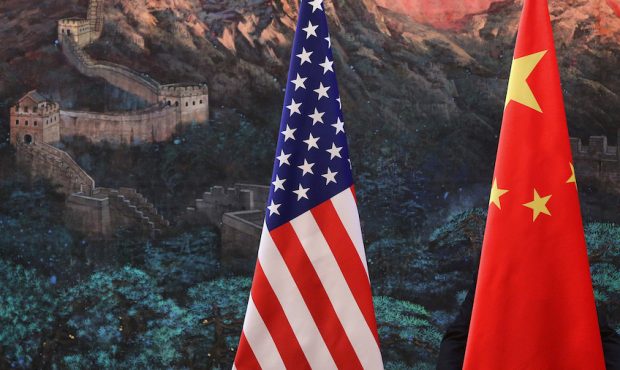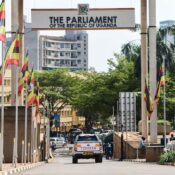
Key officials from the United States and China are scheduled to convene to discuss matters related to the military, Taiwan, and fentanyl
Jake Sullivan, the national security adviser to U.S. President Joe Biden, is currently in Beijing for a series of discussions with senior Chinese officials. The purpose of these discussions is to alleviate tensions between the two superpowers in anticipation of the Nov. 5 U.S. election.
The two nations are at variance over the Middle East and Ukraine, Chinese territorial claims from Taiwan to the South China Sea, and trade. Sullivan, China’s top diplomat Wang Yi, and others will convene for the talks from Tuesday to Thursday.
Upon his arrival in Beijing on Tuesday, Sullivan first encountered Wang at a luxurious resort located on the northern boundaries of the Chinese capital. The two exchanged greetings in front of a picturesque portrayal of the Chinese landscape and Chinese and American flags.
Wang characterized the China-U.S. relationship as “critical,” with a global impact, and that it has undergone “twists and turns” during his remarks to journalists.
Wang also expressed his aspiration for the two nations’ relations to transition to a state of sustainable, healthy, and stable development.
Sullivan stated that both parties would discuss areas of accord and disagreement that “must be managed effectively and substantively” before entering a closed-door meeting.
Biden has advocated for direct diplomacy in the final months of his presidency in order to prevent tensions with Chinese President Xi Jinping. It is probable that U.S. Vice President Kamala Harris, the Democratic candidate in November’s election, would adopt a comparable approach.
Nevertheless, there are numerous analysts who are in agreement with Republican former President Donald Trump and believe that this approach is excessively mild in light of China’s escalating foreign policy.
Sullivan aims to extend military-to-military discussions to the theater command level, a measure that Washington anticipates could avert conflict in specific regions, such as the Taiwan Strait.
The United States also desires that China adopt additional measures at home to prevent the development of chemicals that can be converted into fentanyl, the primary cause of drug overdoses in the United States, and to establish a consensus on the safety standards for artificial intelligence.
Beijing intends to discuss its assertions of sovereignty over democratically-ruled Taiwan and its disapproval of U.S. tariffs on a variety of manufactured products and export controls that target Chinese chip makers.
“China will focus on expressing serious concerns, clarifying its solemn position and making serious demands on the Taiwan issue, the right to development and China’s strategic security,” according to the Chinese ministry of foreign affairs.
“The United States has continuously taken unreasonable measures against China in terms of tariffs, export controls, investment reviews and unilateral sanctions, which have seriously undermined China’s legitimate rights and interests.”
The potential for the Gaza war to escalate into a more extensive regional conflict is also being closely monitored by both parties.
The mission by Sullivan is the first by a U.S. national security adviser since 2016. He has engaged in consistent discussions with Wang regarding the management of competition between the superpowers, and their most recent meeting occurred in Bangkok in January.
Additionally, the two officials in Beijing have the potential to establish a trajectory for the concluding meeting between Biden and Xi. In November, the leaders of the Asia-Pacific Economic Cooperation Forum and the Group of 20 will convene at the summits in Peru and Brazil, respectively.
HARRIS VS. TRUMP?
Harris declared her intention to guarantee that “America, not China, will emerge victorious in the 21st century” upon accepting the Democratic nomination last week.
She has dedicated a substantial amount of time to fortifying U.S. relationships with China’s neighbors, including Japan, South Korea, and Vietnam, in her capacity as vice president.
Trump has pledged to impose tariffs on all products, with a particular focus on those from China. Under a new Republican administration, his allies have pledged their support to China’s neighbors, including Japan and South Korea.
According to individuals with knowledge of the situation, U.S. intelligence indicates that China has no preference in the forthcoming election.
Since the U.S. destroyed a suspected Chinese surveillance balloon last year, the United States and China have endeavored to restore their strained relationship, which suffered a historic low.
At a summit in November of the previous year, Biden and Xi reached an agreement to have their respective teams address military matters, artificial intelligence, and the reduction of illicit fentanyl production.
However, problems continue to exist. China has never renounced the use of force to bring Taiwan under its control, and self-ruled Taiwan is currently facing increased pressure. Taiwan’s most significant supporter and arms supplier is the United States.
In the most recent of a series of maritime and air confrontations in the strategic waterway, the Philippines, which is allied with the United States, and China engaged in another combat in the disputed waters of the South China Sea on Sunday.
Biden has implemented tariffs on Chinese goods that are perceived as a threat to U.S. national security and manufacturing. Just last week, his administration added 105 Russian and Chinese firms to a trade restriction list in response to their purported support of the Russian military. This action was condemned by China.
China has pledged retribution, and Foreign Minister Wang has stated that the restrictions indicate that certain individuals in the United States may be “delusional.”
All Categories
Recent Posts
Tags
+13162306000
zoneyetu@yahoo.com



